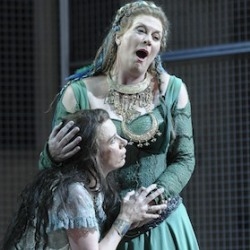Norma (Holland Park)
Bellini’s bel canto classic in an arid staging, saved by some great singing

© Fritz Curzon
Fuchs’s dour aesthetic makes her an uncomfortable fit for a world that’s about as kitchen-sink as Turandot or The Pearl Fishers. As with her Fidelio (also for Opera Holland Park), the director relocates Norma to a detention compound where soldiers in desert fatigues guard a collection of Roma-esque detainees in something resembling the Balkan upheavals of the 1990s. After a day of bucolic peasanting the 30-odd prisoners slowly shuffle on, handing in their tools on the way, and languish inside a wire-fence enclosure. The biddable OHP Chorus undertakes this protracted entrance routine three times during the course of the opera.
Norma, of course, is hokum: a delightfully silly tale of soldiers, bards and druids. But instead of finding a way of channelling the material on its own terms, Fuchs and her designer, Niki Turner, weigh it down with so much modern baggage that the opera’s dramatic context is bleached away till nothing remains but the bare bones of a love triangle. Druidess Norma and priestess Adalgisa both have the hots for Pollione, a Roman proconsul. End of.
If ever a questionable production was redeemed by its star singer, though, this is it. Yvonne Howard is a sensational Norma. The taxing nature of the role cannot be exaggerated – it’s bel canto with bars of steel – yet Howard, one of our greatest dramatic sopranos, made light of its challenges. Masked sporadically by poor ensemble disposition during the immortal ‘Casta diva’, obliged to endure rather too much generic stage mauling from Pollione (a valiant performance by Joseph Wolverton, who is not a natural bel canto tenor) in the duet ‘In mia man alfin tu sei’, Howard always emerged with dignity unscathed.
Magnificent duets
The evening’s revelation was Heather Shipp as Adalgisa. The young mezzo’s star has risen fast in recent times, and she confirmed her versatility by following up a terrific turn as Second Norn in Opera North’s Götterdämmerung, only last month, with this completely different role. What Shipp’s acting lacked in finesse it made up for in engagement, and vocally she matched Howard pace for pace in their magnificent duets.
The fine bass Keel Watson, who was saddled with a most unfortunate costume, did what he could with the shamanic figure of Oroveso, although in the confines of the production that was relatively little. Jung Soo Yun, mellow of voice, fared better in the throwaway role of Flavio, Pollione’s confidant, and Rosalind Coad did well to make something of Norma’s attendant Clotilde while simultaneously shepherding her mistress’s two small children around the stage.
Peter Robinson shaped a vibrant account of the score and drew sparkling playing from the City of London Sinfonia. Together they gave it their customary all, despite the limited ambition of Bellini’s repeated broken chords and rum-ti-tum orchestrations. The members of the OHP Chorus, too, were a splendid team who rose above Fuchs’s tree-hugging and slo-mo hand-jives to induce shivers with their rich choral moments.













